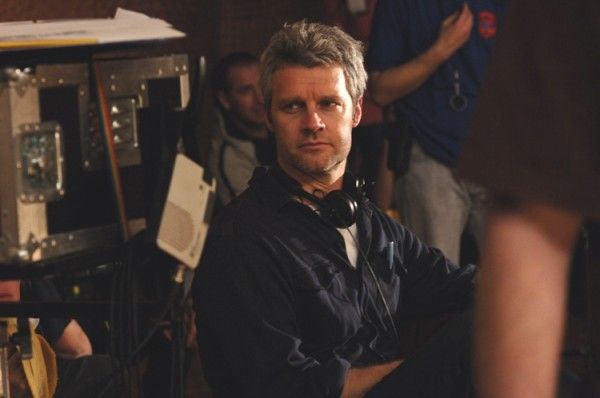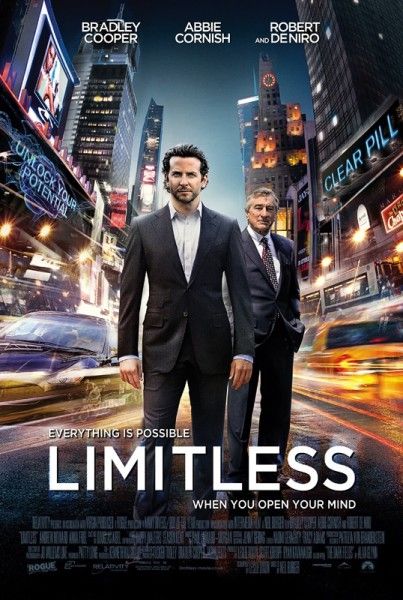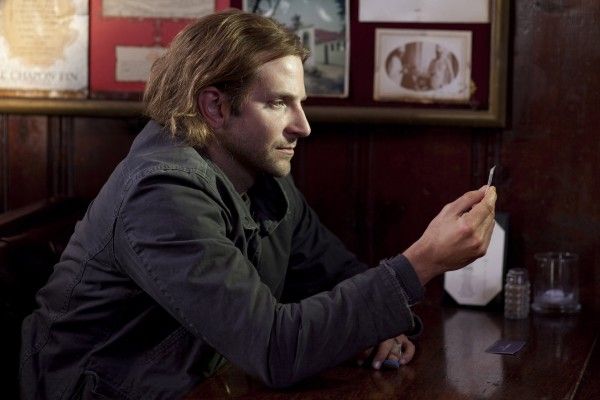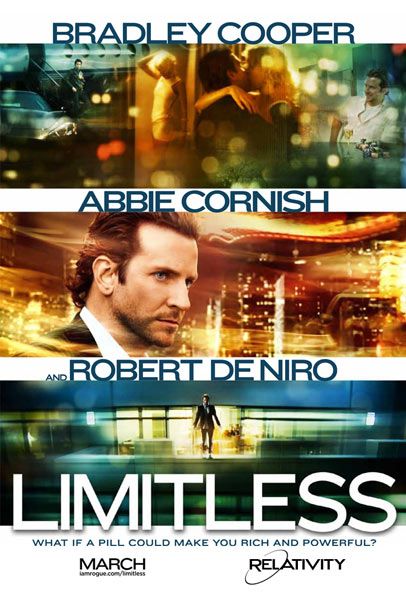The number one movie in America right now is director Neil Burger’s (The Illusionist) Limitless. Starring Bradley Cooper, Abbie Cornish, Anna Friel and Robert De Niro, Limitless has a very cool premise: what if a drug allowed you to use 100% of your brain. You could “recall everything you’ve ever read, seen or heard, learn any language in a day, comprehend complex equations and charm anyone you meet.” Sounds cool doesn’t it? The fact is, with advances in pharmaceuticals happening every day, the premise for Limitless might not be too far off. Maybe we’ll never get to 100%, but I’ll bet you that in the next few decades, scientists will invent some sort of pill that makes you smarter.
A few days ago I was able to do an exclusive phone interview with Burger. We talked about what it's like to have the number one movie, why they reshot the ending, the cool way he shot the sequences when Cooper was on the drug, did he do any research or talk to pharmaceutical companies before shooting, deleted scenes and what will be on the DVD/Blu-ray, how Shia LaBeouf was originally going to star and how the script changed to fit him and then Cooper, how did they get Robert De Niro, and what does he have coming up. Hit the jump to either read or listen to what he had to say.
If you'd like to listen to the audio, click here. Otherwise the full transcript is below. Limitless is now in theaters. You can click here for all our previous coverage which includes clips, posters, and our review.
-
Collider: How does it feel to have a number one movie in America?
Neil Burger: It feels pretty cool actually. It feels great. You work so long and so hard on it and you kind of run on adrenaline for 18 months to get this thing made and then to actually have it be well received and in fact be number one is fantastic. It’s fantastic.
Did you get any sort of gift bag from Relativity for having their biggest opening ever?
Burger: They have been great. I got something after we finished and we were towards the end of post production. They threw us a big party for the premiere. So we are all doing great.
I know it’s a little unusual to talk after the film has come out a week later, but I really enjoyed your movie. Something that I heard through the grapevine was that you reshot the ending and that the original ending was a little bit more ambiguous. The ending that you have released is a little bit more definitive. Could you talk about whether or not that is true and the reason why you did that?
Burger: Well, we were working very fast. I think the original production was about 43 days, which for the number of locations, effects, fights, and all of that stuff we were doing was a pretty tight schedule. So we were moving quickly. We had never quite loved the ending. [Screenwriter] Leslie [Dixon] and I had gone back and forth on trying to figure out how to nail it down. We were changing it and fine tuning it till the end. Literally, on the day as we went into it we were like, “I don’t think this is quite it.” So we shot it and it’s actually conceptually the same as the ending that is there…kind of. What we reshot is almost like an expansion of what had been in the original ending. So we got to the end it and what was interesting was that once we put the film together my editor, Naomi Geraghty, and I with another editor, Tracy Adams, who was another editor who came on a little bit later, got to the ending of our first assembly and we were like, “Well, it’s really good and we like it, but the ending is not quite there.” So I started working on it right away. I started coming up with ideas and I was pitching them to Leslie [Dixon] to write, but we could never get De Niro and Bradley [Cooper] in the same place at the same time until about two months ago actually in January. So, we then went out and did it. It’s different, but it’s based on the same. It just has more beats. It’s just bigger, stronger, and a more powerful ending. I mean, it’s slightly ambiguous as well, but it’s a more definitive ambiguity.
Something that I really liked about the film is the way you zoom in on photographs and also how you change the look of the film when Bradley starts popping pills with the cinematography and colors. Could you talk about the style that you chose to go with and the way you handled the pictures with the way you zoomed in.
Burger: Basically, part of the fun and challenge of putting this movie together was “How do you show what it’s like to be on this drug?” I wanted those looks to be really organically and emotionally connected to character. I wanted you to be in his head and feel how it felt rather than going into some digital CGI world. In a larger sense, there is a number of different looks in the movie. There is the look when he is regular Eddie at the beginning of the movie, which is kind of “gritty New York” and it’s hand held with a rougher kind of feel. It’s a harsher sort of look and that is what his experience is like. Then, when he comes on to the drug everything gets kind of more luminous and it begins to glow. The colors and light is glowing. His things are going much more smoothly for him so the camera is gliding along with him. It’s wider lenses and it’s a different feel. When he comes off the drug and he is ill and having these blackouts because of it – that is a whole other look entirely as well.
You mentioned that you had a 43 day schedule. Obviously, you have to pick and choose where you want to spend your time. Could you talk about trying to come up with a unique look for the film and also trying to do it in that kind of schedule?
Burger: Mostly, to pull it off in that schedule, you have to really prepare everyday. I really worked on those looks. We knew that when he was “regular Eddie” we were going to do it with almost a reduced crew. We were going to do it in a much more raw, hand held, rougher way. So when he was on the drug and everything had to be cleaner the camera would be on a dolly or crane. That takes more times to set up and that is where we were going to spend more time and money. The same thing goes for the effects and picking and choosing what could be done in camera and what was going to be done in post. It’s just really a matter of being prepared so that you walk in and know exactly what you want to do so you’re not standing around thinking, “How are we going to shoot this scene?” Sometimes, you lose some spontaneity from that, but you at least get it done.
I think one of the reasons the audiences responded to the material is that we all believe that we are right on the cusp that pharmaceuticals could be possibly have one of these kind of pills in the future.
Burger: Yeah.
I don’t think anyone thinks that it is that far off. Did you do any research and talk to pharmaceutical companies to see how much is this fantasy and how much of this is reality?
Burger: I did do a lot of research reading up on how people work. You know, whether it be Alzheimer’s drugs, which are doing certain things, and other things that are affecting your brain chemistry. Most of those are therapies for, like as I said, Alzheimer, or other problems. But, you know, it’s not so different from how people are repurposing Adderall or Ritalin. If you are in college today then you know that 25% percent of those students are using those drugs to study. So I was just aware of how those affect your body and what it did to your mind. How did it feel when you are on those drugs and what was the brain chemistry? What was going on neurologically when you put those chemicals into your body? So, yeah, I did a bit of research on it. I like all of that stuff and I like getting into all of that research. You do as much as it informs the character and the narrative. You know, maybe you do a little bit more because you are really interested.
I’m going go on a complete tangent on one of your other films just because I want to talk to you about it. I loved The Illusionist. It is one of those films that whenever it pops on I am always watching it. Do you have people always wanting to talk to you about that film because it somehow impacted them in some way?
Burger: People are fond of that movie and I really appreciate that because I like it and I worked really hard on it. It’s really gratifying that people dig it and continue to watch it. That is great.
I just had to tangent for a second. Obviously, you must have some deleted scenes. Could you talk what might be on the DVD and Blu-ray for Limitless down the road?
Burger: You would be surprised by how few deleted scenes we have. With our 43 days we got the scene and we got it done. We edited them together and they are in the movie. There are a few different things in it. I will tell you one thing – the movie was supposed to be rated R. So in the director’s cut version it has a much more rollicking, freewheeling, sexual, and a crazier feel to it. It has a more dangerous and kind of hotter sexual feel to it. Some of it is more violent. The whole blood drinking scene is actually, which I like that blood drinking scene now, but the way it was originally intended when they made us cut down…watching that with an audience, which I have done, we get a full on 30 seconds of the audience just going berserk as that is happening. Now, it’s not quite as effective as that. I mean, it’s still effective, but the original version of it is more insane.
I was going to say that when I watched your movie in the theater it really gets a huge reaction with the just the little bit you showed. I cannot imagine 30 seconds.
Burger: Yeah, it’s insane. The whole audience just goes insane because of this scene being drawn out and just the anticipation of what is going to happen.
I want to ask you about the casting. If I’m not mistaken, and I might be, wasn’t Shia LaBeouf originally attached to this or am I wrong?
Burger: No, you’re right. He was. I had actually gotten Shia involved when the movie was originally at Universal. So, you know, we were trying to find some universal actor. Obviously, they want a big international star to be in it, but they want to do it for a price, and somehow he fit into that category. We actually did quite a bit of rewriting to make it work for a guy that was I think 22 at the time. We were going to play it as a 24 year old, which deserved a different story, but we felt like it still worked. You know, I really like Shia a lot. He is a great guy, but he fell out of it. Then, luckily, The Hangover was just coming out and we knew Bradley from before and liked him. Somehow, The Hangover is thing that made it possible for us to use him.
Was it a radical change in terms of the script?
Burger: No. For example, in the script and story now he has been married before. You know, he is playing a guy that is in his early 30s, which is the way the book is written and the way was originally written. So then you change to a guy that 24 and, well, he hasn’t been married, but he has had a love in his life that has fallen apart. So it just becomes that you make a bunch of adjustments that way. Right now in the movie, Bradley is a guy who had maybe a touch of success 10 years ago, and it has all just been downhill. In a version with a younger guy, it is somebody who is more just coming up against brick wall right after college or whatever.
Can you talk about getting De Niro attached to the film? You have worked with some good actors, but, you know, you get De Niro and it is still De Niro. Can you talk about when he said “Yes.” And what was your reaction?
Burger: I had met De Niro actually after The Illusionist and we had talked informally about doing something together, and then this came up. It was like, “Who better to play a guy of that age who embodies a sense of power?” To me, the movie is about power. So we worked on getting him and then finally Leslie [Dixon] wrote some great lines and we nailed him. I had been working with him during that process. I was going in and talking to him about the screenplay. We expanded some things in the script for him, which was great. We would have done it for anybody actually, but he was the first guy up because he was our first choice. By the time that he said, “Yes.” and he was in I was feeling pretty comfortable with him because I had already been working with him quite a bit on it. Still, as you say, it’s De Niro and he walks on the set you are like, “Alright. What do we have here? How is this really going to go down?” But he was fantastic actually. The hardest thing is the first time you give him a direction where you are not quite getting what you want or you want to change something slightly. That is really nerve wracking, but he is incredibly collaborative and wanted direction and asked for direction. He took direction and changed his performance based on the direction. It was a real pleasure actually.
I’m a fan of all of your movies so I speak to you as a fan and also as a reporter. Have you started thinking about what you are doing next?
Burger: I have been thinking about it a lot, but I don’t have the project locked down. There are a couple of different things that are in play. Some of them are big, some are small, and some are in between. I don’t know which one, and I like them all. There is really just a handful because that makes it sound like there are a dozen. But, really, there are only a couple of things that are in play. I can’t jinx it really by saying what they are because the minute I do they will all go away. But there are a couple of things in play, but I don’t know what it is going to be yet.
When you have the number one movie do you all of a sudden find yourself on Monday and Tuesday having a lot more meetings?
Burger: Potentially you do. There is definitely more interest.





